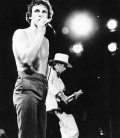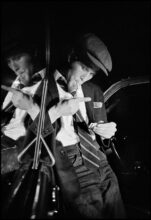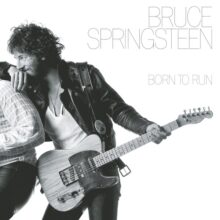‘The Lamb Lies Down On Broadway’, the last Genesis album to feature Peter Gabriel, turned 50 this week.
‘The Lamb Lies Down On Broadway’ was released on 22 November 1974. Peter Gabriel was the band’s lead singer, Phil Collins was the drummer. When Gabriel left to go solo, Genesis took the gamble of “promoting” the drummer to lead vocal duties. It paid off big time.
‘The Lamb Lies Down On Broadway’ was a top 10 album in the UK and reached 41 in the USA and number 80 in Australia (after being played in Sydney on the band new 2 Double J radio station (now Triple J nationally).
The best-known song from the album was ‘Carpet Crawlers’.
Genesis decided to make a concept record and a double album with ‘The Lamb Lies Down On Broadway’. It tells the story of a Pueto Rican boy named Rael who goes on a journey of self-discovery.
Gabriel decided that he would write all the lyrics and that the four other guys would write the music. The band usually collaborated but Peter thought that a concept album needed one narrative and argued few books were written by committee. The disagreement caused the rift between Peter and the rest of the band.
Genesis supported the album with 102 dates across America and Europe with the album performed in its entirety. A live recording of the whole album has never been released but a lot of it was included on the box set Genesis Archive 1967-75.
Gabriel announced he was leaving the band to the band in November 1974 but it wasn’t made public until the end of the tour in June 1975.
Genesis followed up the album as a four piece with ‘A Trick of the Tail’ in February 1976. That was followed by ‘Wind & Wuthering’ that same year in December 1976. Steve Hackett left after ‘Wind & Wuthering’. The next album ‘…And Then There Were Three’ became the band’s biggest album to date and featured the hit ‘Follow You Follow Me’.
‘…And Then There Were Three’ established Genesis as a major international act. The next five albums reached number one in the UK. ‘Duke’ (1980), ‘Abacab’ (1981), ‘Genesis’ (1983), ‘Invisible Touch’ (1986) and ‘We Can’t Dance’ (1991). But that stage Phil Collins had become a superstar as a solo artist in his own right and left the band in 1996.
Stay updated with your free Noise11.com daily music news email alert. Subscribe to Noise11 Music News here
Be the first to see NOISE11.com’s newest interviews and special features on YOUTUBE and updated regularly. See things first SUBSCRIBE here: Noise11 on YouTube SUBSCRIBE



















